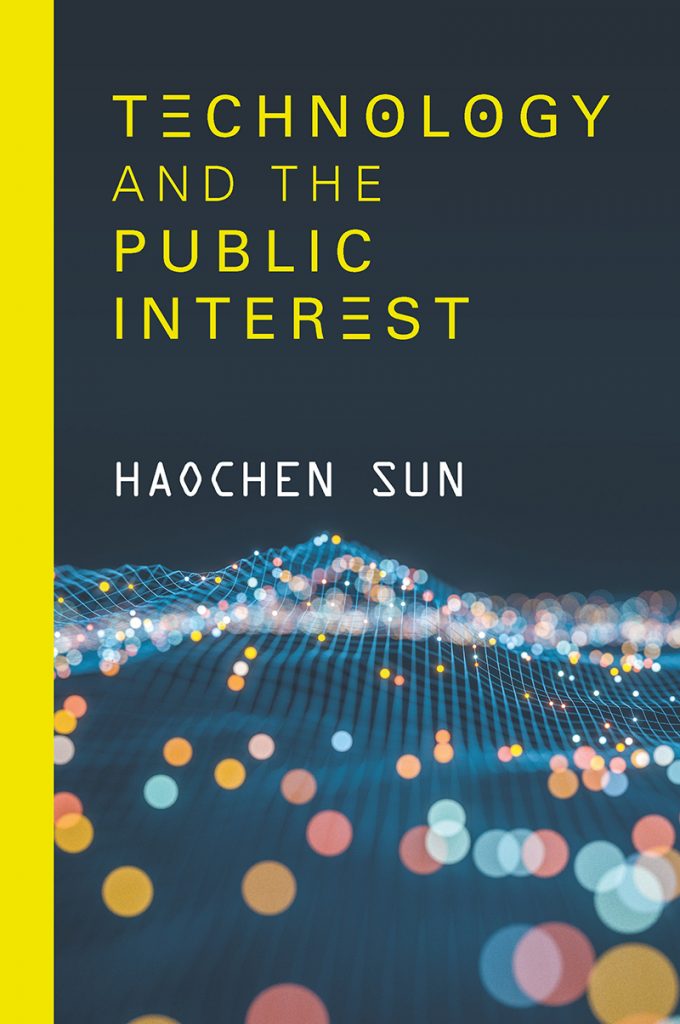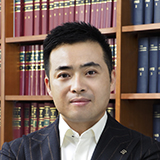May 2022 | Volume 23 No. 2
Your Right to Technology
The COVID-19 pandemic has made abundantly clear that new technologies are critical to modern life. We have needed internet connections to sustain school, work, entertainment and social ties, and widespread distribution of new vaccine technologies to resist the virus. However, access to technology has been far from universal. Against that backdrop, Dr Haochen Sun of the Faculty of Law has produced a new book, Technology and the Public Interest, that seeks to address the problem of unequal access to technology.
His premise is that technology is a human right and should be used in the public interest. This concept is not new – it is included in the Universal Declaration on Human Rights, which was adopted by the United Nations in 1948 in response to the great harm caused by technologies such as gas chambers and atomic bombs, with the aim of promoting technology in the service of humanity. “But it has become a dead human right. Have you ever heard of it?” he said.
Dr Sun aims to breathe new life into this right. There are various reasons why it has fallen off the radar, he said – such as the difficulty of defining technology and the inadequate enforcement of other human rights – but the biggest obstacles are posed by intellectual property (IP) rights. The time has come to address the issues.
“During the past few decades, international leaders have pushed for a higher level of protection of IP rights as a way to ensure technological benefits will be disseminated through market-based modes. This means the IP owner in many cases has final say over who gets access to the technology they develop, normally through fees that they charge,” he said.
Corporate responsibilities
The problem with this became apparent during the pandemic. Unequal distribution of COVID-19 vaccines and varying charges that countries paid for those vaccines is an obvious example; some people have not even received their first vaccinations, while others are on their fourth dose. But there were also inequities in daily living.
Without sufficient internet access at home, students could not keep up with classes, workers could not attend online meetings, and important online social events, such as weddings and funerals, were missed. It also meant more difficulty getting information about the pandemic and making bookings for vaccinations. Even simple things like fending off boredom during lockdowns by watching videos or streaming services were not possible.
“The pandemic has made the problem of access to technology visible,” he said. “The internet has become as important as electricity. We cannot live without it. That’s why I argue we should define technology as a fundamental human right.”
Access is not the only problem. Dr Sun began working on his book before the pandemic started, following cases in which tech companies abused their power, such as Facebook sharing users’ personal information with Cambridge Analytica, which was the worst privacy breach in human history, and the American hedge fund manager who bought the patent to the drug Daraprim and overnight jacked up prices from US$13.5 per tablet to US$750.
“There’s an asymmetry of power. Technological companies have unprecedented power to regulate individual user’s lives and society’s operations. I argue we should re-think the nature and scope of their responsibilities.”
He believes tech companies should reciprocate to users who contribute to their technologies’ development, such as participants in COVID-19 vaccine trials who have contributed to vaccine development and individuals who upload video content to YouTube and TikTok.
Second, tech companies have an ethical role responsibility as innovators that they should properly fulfil to benefit society, just as the captain of a boat has a role responsibility to transport people and cargo safely.
And third, tech companies have a responsibility to confront injustice caused by technological progress, he said.
A collective right
Dr Sun’s book also wades into the question of individual versus collective rights and how that interacts with IP protection. “I argue that the right to technology should not be defined as an individual right but protected as a collective right, because it is in society’s interest to share the benefits and prevent harm that technology can cause.”
This collective human right should be protected under both international law and domestic civil rights law, he said, and could potentially become a fundamental right under domestic constitutional law – meaning citizens could sue their governments if they are cut off from access.
Dr Sun stressed that he does not advocate everyone having access to an iPhone or other non-essential technologies. Rather, they should have access to the internet infrastructure that supports these, just as roads provide access to all.
“Technology has become the major driver of our economic, cultural and political life. We have to talk about access to technology as a human right so that everybody can benefit and we can prevent serious harm caused by improper application of the technology. I think this will become a frontline issue in human rights protection for years to come.”

Technology and the Public Interest
Author: Haochen Sun
Publisher: Cambridge University Press
Year of Publication: 2022
Technology has become the major driver of our economic, cultural and political life. We have to talk about access to technology as a human right so that everybody can benefit and we can prevent serious harm caused by improper application of the technology.

DR HAOCHEN SUN

